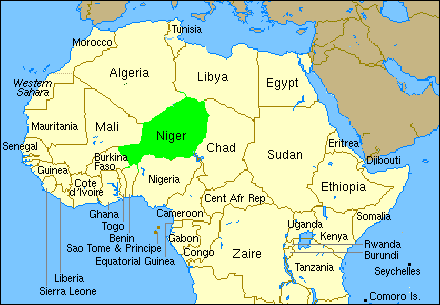NIAMEY, Niger — The chief executive of French nuclear giant Areva visited the mining town in the north of Niger where seven foreign employees were kidnapped by an al-Qaida-linked cell. The visit on Friday came amid criticism in the French press that the company did not do enough to protect its workers.
CEO Anne Lauvergeon said the company would continue its mining operation in Arlit and said executives were studying what security measures needed to be put in place.
Areva's foreign workers were evacuated and many were repatriated to France after the bold Sept. 16 attack by al-Qaida in the Islamic Maghreb, whose gunmen succeeded in entering the gated residential area where the foreigners were living.
The seven who were kidnapped — including five French nationals, a Togolese and a Madagascan — were grabbed inside their villas while they were sleeping.
"We are concerned about the lives of the hostages. Our first mission is seeing that they are liberated as soon as possible," she told reporters after her return to the capital Niamey. "The question of security will be studied so that our operation can return to normal."
Although the town of Arlit is patrolled by 350 Nigerian soldiers, the guards employed by Areva to secure their operation were not armed following an agreement between the company and Niger.
The French newspaper Le Monde published a letter dated Sept. 1 from the prefect of Arlit to Areva in which he warned of a growing threat from al-Qaida and said that local authorities needed more resources to be able to secure the area.
Areva spokeswoman Fleur Floquet told The Associated Press that the company had sent its head of security to visit Arlit just one day before the kidnapping occurred and he examined the operation and found the area secure.
On Thursday, al-Qaida in the Islamic Maghreb released a tape indicating the seven hostages were alive. They are believed to have been taken to Mali. They are shown sitting in the sand with a sloping dune in the background, terrain typical of the northern Mali desert where al-Qaida has forged alliances with the Tuareg nomads.
In the tape, the seven people being held are asked for a name, job title and the place they come from.
They each acknowledge that they were taken by the al-Qaida offshoot, which has its roots in an Algerian extremist group that later forged a 2006 alliance with al-Qaida.
No demands have yet been made for the hostages, but in the past al-Qaida has asked for multimillion dollar ransom payments as well as the release of their militants.
Last year, British hostage Edwin Dyer was assassinated by the same cell, allegedly after the British government refused to cede to demands including cash and the release of Abu Qatada, an extremist Muslim cleric jailed in England who has been called the spiritual head of al-Qaida in Europe.
Rukmini Callimachi contributed to this report from Dakar, Senegal.
Copyright © 2010 The Canadian Press.
=================================================
================================================

No comments:
Post a Comment